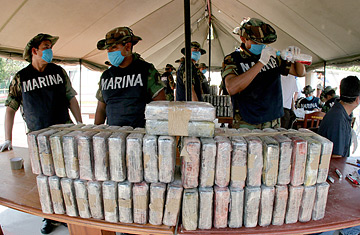
Police officers stand next to packages of cocaine seized from a ship in Manzanillo, Mexico. The seizure, around 23.6 metric tons (26 tons) of cocaine, is considered to be one of the biggest drug busts on record.
Despite their reputation for incompetence, corruption and abuse, Mexico's police and military are pretty good anti-drug cops. That is, when they want to be. In recent weeks there has been some impressive interdiction work south of the border, including last week's seizure of 23.5 tons of cocaine — with a street value of more than $400 million — at the Pacific coast port of Manzanillo. It was, in fact, the largest coke bust in Mexico's history.
But there is a strong incentive for the massive show of efficiency: the U.S. Congress is currently debating whether to approve President Bush's two-year, $1.4 billion anti-drug aid proposal for Mexico. Veteran observers remark that every time Mexico wants to ensure U.S. State Department certification in the drug war, scores of Mexican drug traffickers get rounded up. Every time Mexico wants U.S. helicopters, mountains of methamphetamines suddenly get intercepted on their way across the border. The problem is, once Mexico wins the prize, a lot of its law enforcement usually repays the favor by joining up again with the country's drug cartels. That was the case a decade ago when, after Washington agreed to begin sharing important anti-drug intelligence with Mexico City, no less than Mexico's drug czar, Army Gen. Jesus Guterriez Rebollo, was discovered to be in the pocket of Mexico's major drug lord. "We've seen this movie before," says drug expert Bruce Bagley, professor of international relations at the University of Miami. "It's gotten to be almost a ritual."
It's time for a fresh approach: The U.S. has to make sure the aid is accompanied by a genuine modernization of Mexico's local, state and federal law enforcement, whose officers all too often become members rather than opponents of Mexico's $25 billion-a-year drug trafficking industry. "The U.S. must be strict and demanding in that sense this time," says Bagley, echoing a chorus of anti-drug analysts in both Mexico and the U.S. "If we make this aid an open spigot without transparent and measurable criteria for the professionalization of Mexico's police forces, then it risks being money wasted."
Experts like Bagley agree that reform at least seems more likely under new Mexican President Felipe Calderon, who during his first year has made a major military push against the nation's increasingly bloodthirsty drug cartels. (One of Calderon's cabinet-level anti-drug advisers, Sigrid Arzt, is one of Bagley's doctoral students.) Mexico's Public Security Minister, Genaro Garcia Luna, has begun a serious purge of the federal police as well as a training program for federal and state cops under U.S., Canadian and European tutors. None of that will mean much, of course, if Mexico doesn't start paying its cops salaries decent enough to make them less vulnerable to drug cartel recruitment — and many feel a good chunk of the new aid package should be used for just that purpose. But either way, Garcia declared that last week's Manzanillo seizure "reaffirms the reach of [Calderon's] strategy... to break the operational networks of organized crime groups" in Mexico.
Still, the stakes are higher this time because the U.S. is giving more money and more valuable equipment to Mexico than usual. Although the aid package doesn't reach the annual $1 billion-plus that Washington shells out to Bogota under Plan Colombia, it contains a cache of high-tech law enforcement toys the U.S. has been wary to share in the past, due to the risk of having them fall into Mexican traffickers' hands. (The leaders of Mexico's most vicious drug gang, a group of ex-army special forces soldiers known as the Zetas, are experts at high-tech communications.) Among them: sophisticated telephone eavesdropping; systems to track cell phones; lie detector machines and, perhaps most important, criminal data bases.
U.S. and Mexican officials also say heavyweight interdiction tools like Blackhawk helicopters are being discussed. As a result, many analysts believe the higher value of the aid package and its offerings could serve as more effective leverage to persuade Mexican law enforcement to finally get its act together — especially if it makes different police and military branches compete for the booty.
But the aid's real value is probably political, at least in the eyes of the Bush Administration. The conservative Calderon is a rare U.S. ally in a Latin America that is increasingly steering leftward. Because he won last year's presidential election by a less than 1% margin, the White House sees the aid as a solid means of shoring up his stature at home and abroad. It also allows Bush to look as if he's fulfilling his own 2000 campaign pledge to make Mexico a foreign policy priority — after the country was anything but the past seven years.
The U.S. is in no position to cut off funding, given the unprecedented cross-border drug flow and drug-related bloodletting Mexico is suffering today. It's the kind of south-of-the-border instability Washington can never stomach for too long. But perhaps this time there will some incentive for Mexico's cops to deploy their skills long after U.S. aid arrives.
